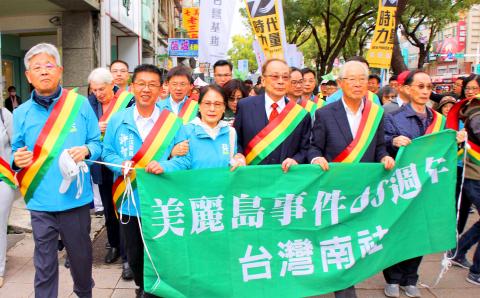A parade marking the 40th anniversary of the Kaohsiung Incident was held in the city yesterday to commemorate the sacrifices of people who fought for the nation’s democracy, freedom and human rights.
The Kaohsiung Incident, also known as the Formosa Incident, refers to a police crackdown, under the then-Chinese Nationalist Party (KMT) regime, on a rally held by Formosa Magazine and opposition politicians on Dec. 10, 1979, to mark Human Rights Day.
The event is generally recognized as an important turning point in the nation’s democratization.

Photo: CNA
Yesterday’s parade, jointly organized by the Defend Democracy Safeguard Taiwan Alliance, the Taiwan Society and several other local civic groups, marched around the roads surrounding the Kaohsiung Mass Rapid Transit (MRT) system’s Formosa Boulevard Station.
Former premier Chang Chun-hsiung (張俊雄) — who provided legal counsel for several victims following the incident — and human rights activists from Taiwan and abroad attended the parade, which also featured speeches by a number of victims of the incident.
Although the incident is now a distant memory, the people of Taiwan today should cherish their hard-won democracy, freedom of speech and human rights, Chang said.
President Tsai Ing-wen (蔡英文) took part in the parade briefly before heading to another event.
Other participants included representatives from Amnesty International, and human rights activists Klaus H. Walter from Germany, and Masahiro Watarida and Takayuki Munakata from Japan.
The parade concluded with a prayer led by pastor from the Presbyterian Church.
Presidential Office Secretary-General Chen Chu (陳菊) took part in the prayer, expressing gratitude for living through that era as it has made her life more meaningful.
She also thanked the attorneys who defended for the victims, and the Presbyterian Church in Taiwan and several human rights groups who helped victims of the incident.
Chen was among eight people, including veteran activist Shih Ming-te (施明德) and former vice president Annette Lu (呂秀蓮), who were tried in a military court and given sentences ranging from 12 years to life in prison for their involvement in the rally in 1979. Forty-three other people were tried in civilian courts and given two to seven-year sentences.

A small number of Taiwanese this year lost their citizenship rights after traveling in China and obtaining a one-time Chinese passport to cross the border into Russia, a source said today. The people signed up through Chinese travel agencies for tours of neighboring Russia with companies claiming they could obtain Russian visas and fast-track border clearance, the source said on condition of anonymity. The travelers were actually issued one-time-use Chinese passports, they said. Taiwanese are prohibited from holding a Chinese passport or household registration. If found to have a Chinese ID, they may lose their resident status under Article 9-1

Taiwanese were praised for their composure after a video filmed by Taiwanese tourists capturing the moment a magnitude 7.5 earthquake struck Japan’s Aomori Prefecture went viral on social media. The video shows a hotel room shaking violently amid Monday’s quake, with objects falling to the ground. Two Taiwanese began filming with their mobile phones, while two others held the sides of a TV to prevent it from falling. When the shaking stopped, the pair calmly took down the TV and laid it flat on a tatami mat, the video shows. The video also captured the group talking about the safety of their companions bathing

PROBLEMATIC APP: Citing more than 1,000 fraud cases, the government is taking the app down for a year, but opposition voices are calling it censorship Chinese Nationalist Party (KMT) Chairwoman Cheng Li-wun (鄭麗文) yesterday decried a government plan to suspend access to Chinese social media platform Xiaohongshu (小紅書) for one year as censorship, while the Presidential Office backed the plan. The Ministry of the Interior on Thursday cited security risks and accusations that the Instagram-like app, known as Rednote in English, had figured in more than 1,700 fraud cases since last year. The company, which has about 3 million users in Taiwan, has not yet responded to requests for comment. “Many people online are already asking ‘How to climb over the firewall to access Xiaohongshu,’” Cheng posted on

A classified Pentagon-produced, multiyear assessment — the Overmatch brief — highlighted unreported Chinese capabilities to destroy US military assets and identified US supply chain choke points, painting a disturbing picture of waning US military might, a New York Times editorial published on Monday said. US Secretary of Defense Pete Hegseth’s comments in November last year that “we lose every time” in Pentagon-conducted war games pitting the US against China further highlighted the uncertainty about the US’ capability to intervene in the event of a Chinese invasion of Taiwan. “It shows the Pentagon’s overreliance on expensive, vulnerable weapons as adversaries field cheap, technologically